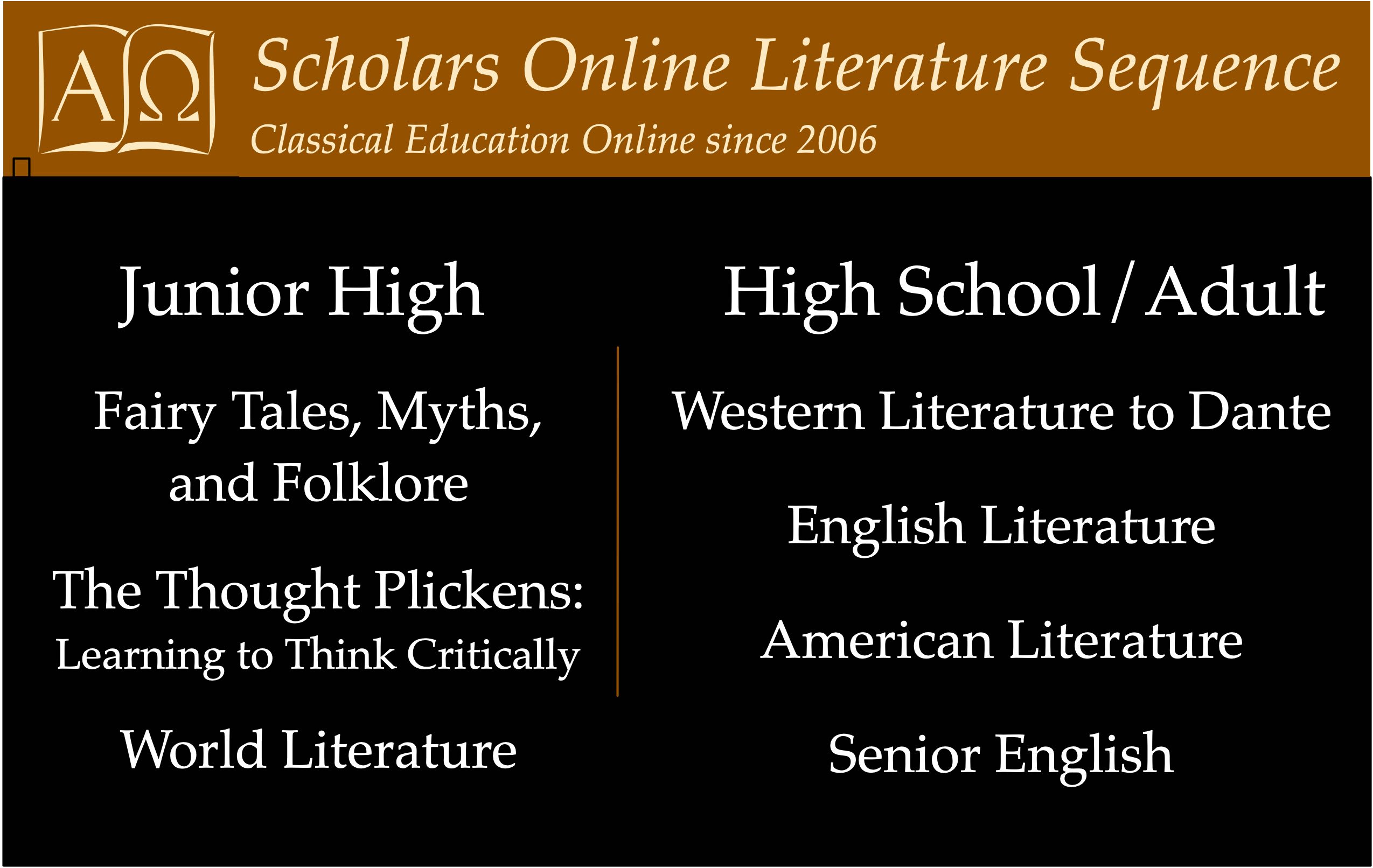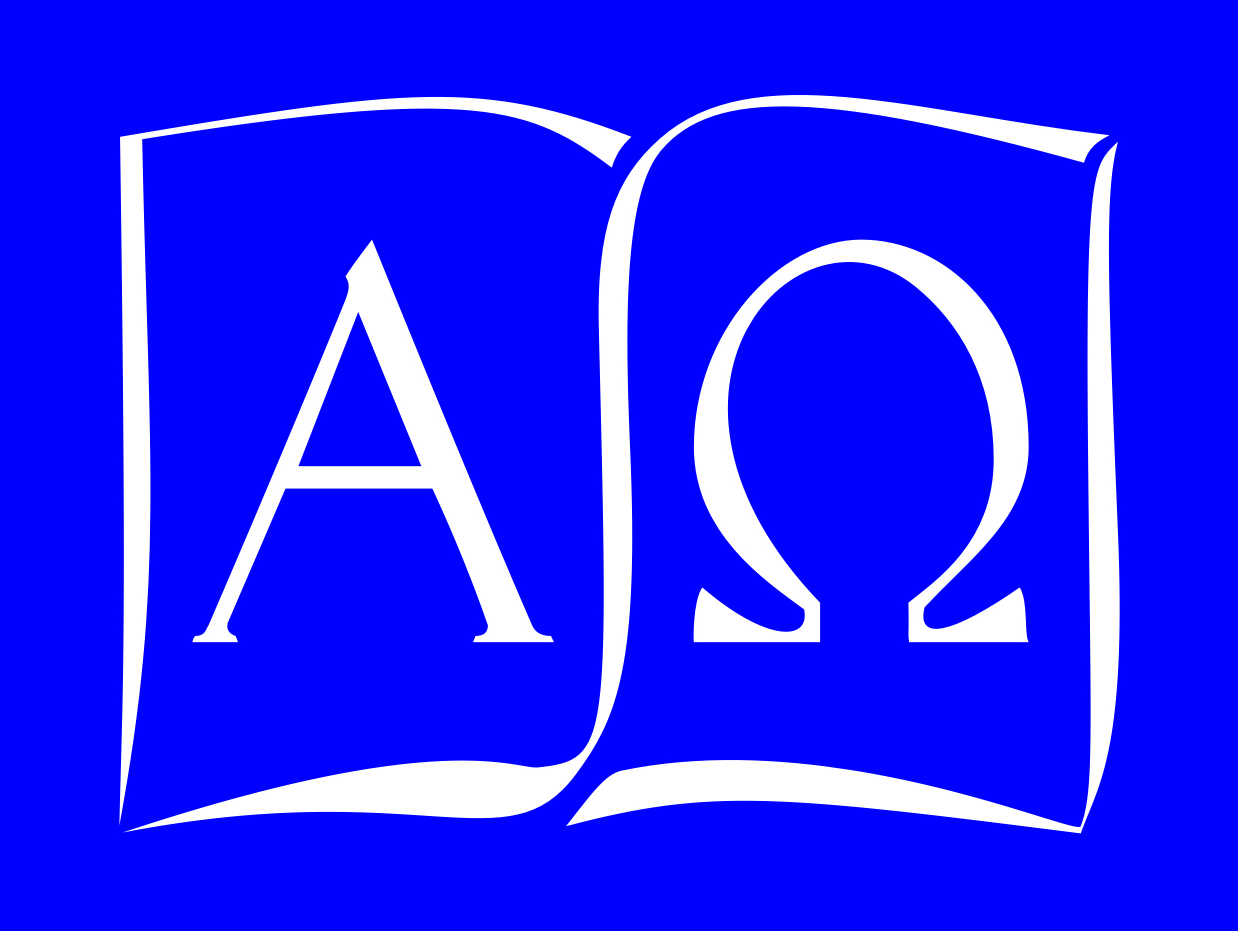Literature Courses Online
Putting Together a Literature Program

Scholars Online Literature Course Sequence
Available Courses
The Thought Plickens: Learning to Think Critically • Academic Year 2025-2026 • Grade 6
Summer Shakespeare II • Summer 2025 • Grade 8
Fairy Tales, Myths and Folklore • Academic Year 2025-2026 • Grade 6
Looking at Middle-earth • Summer 2025 • Grade 7
World Literature • Academic Year 2025-2026 • Grade 7
Western Literature to Dante • Academic Year 2025-2026 • Grade 8
English Literature • Academic Year 2025-2026 • Grade 9
American Literature • Academic Year 2025-2026 • Grade 10
Senior English (Literature) • Academic Year 2025-2026 • Grade 12
To enroll in any of our courses, log into your Scholars Online Account Management Center using the login link at the bottom of any page and select the member you wish to enroll. If you do not have an account, you may create one using the Becoming a Member link under Enrollment in the Navigation bar at the top of this page.
If you are interested in a course not yet offered for this year, please use the EMAIL US link below to contact Scholars Online Administration with your course request.
Our online literature course sequence provides students with a series of integrated classes that foster critical thinking and analysis as well as an appreciation for form and language. Beginning with simple stories and fairy tales, students learn to cultivate a habit of reading for meaning, theme, character development and narrative. The entire seven-year sequence allows them to explore literature from around the world, and from ancient to modern times, and culminates in a challenging Senior English course that demands their best analytic reasoning and most concise and precise writing. Dr. Bruce McMenomy explains the development of this sequence below.
Why Study Literature?
Our goal is to teach students to read well, to encounter ideas seriously and with charity, and to be aware of the structure and craft of each work. Within the curriculum as I have constructed it, I have tried to develop several things:
- Techniques of both extensive and intensive reading. That is, I try to enable students to handle large pieces of material synthetically and in relation to one another, and also to look closely at the little bits of various works, to see how each particular choice of word will count for something in the author’s work. Productive reading in the long run comes from moving back and forth between these two kinds of reading. The one is strategic, the other is tactical. We need both to read well.
- A consistent critical vocabulary. Knowing names is no substitute for recognizing what they refer to, of course, and the mere ability to spout off a long list of terms is itself worthless. But God endowed us with speech and gave us the unique privilege of naming things for a reason. It surely has a proper place in the process.
- Literary continuity. All these literature courses (with the partial exception of Senior English) are organized historically. Reading different works without regard for where they come in the historical sequence is like overhearing a conversation in which the order of lines has been randomized. Similarly, themes that come up in one course are revisited in later courses. Students who learn about ecphrasis in Homer will encounter it in Melville two years later; the issues of the narrative persona we uncover in Chaucer are never again quite out of view.
- An appreciation of the great works. This is not a “Great Books” program as such — at least not as that term is commonly construed. But I do try to cover as many of the recognized literary landmarks as I can, both because they are intrinsically worth covering, and because they can assume from their wide regard a significance sometimes even beyond their intrinsic value. Both are worth understanding.
- An attitude of humility and courtesy in reading. This is perhaps the most pointedly Christian part of the literature curriculum: I encourage students to attempt to understand authors and their works, rather than merely to categorize them as acceptable or unacceptable. For more on this point, I refer you to my essay on Reading and Christian Charity.
These folks are amazing. The depth of reading, historical background, and knowledge they possess and impart to their students lasts a lifetime. If you’re a homeschooling parent or considering it, Dr. M’s literature classes are truly college-preparatory.
—Rachel B.
Individual courses: putting the pieces together
We have endeavored to avoid a smorgasbord-approach affording a variety of tasty-looking options that don’t add up to much. Accordingly the course descriptions may seem somewhat bland. I like to think that the contents are not so. Our students have found that our online literature program provides a rigorous background for college courses in all subjects.
The most basic course in the literature sequence is World Literature. It’s based on a single reasonably thorough anthology with a fair amount of sound interpretive material. Solid readers at the eighth-grade level should be able to deal with the work, but students through the sophomore year should still find it interesting.
Western Literature to Dante covers material from the Old Testament and Homer down to Dante in the West. The emphasis is on extensive reading: we read many entire works here, and cover them quite broadly, but with reasonable intensity as well. There is no textbook, though I publish a separate Parent’s Guide to help parents guide their students through it; the readings are gathered from a variety of sources, and we supplement them with select chapters of Erich Auerbach’s landmark work of literary criticism, Mimesis. This course was conceived from the outset as an introductory course for very strong readers, but it does not presume any very extensive acquaintance with literary discourse. A capable freshman should be able to benefit from it, but it has proven useful to students into their college years. A very strong reader might consider it for the eighth grade, but you should be warned that it’s demanding both in quantity of reading and type of material covered.
English Literature is an historical survey from Beowulf to the present. We use a base textbook, but supplement it with several plays and novels, and a handful of extra outside reading; the emphasis of the course is on intensive — i.e., “close” — reading of texts and exploring the particulars of the author’s use of language. The reading load is accordingly less than that for Western Literature to Dante, but more than that of World Literature. I would not normally recommend it to a student below the sophomore year in high school, but I think it can be beneficial to anyone through the senior year as well. (The course was first built around the Scott-Foresman text England in Literature, now unfortunately out of print; I am looking into alternatives.)
American Literature uses an anthology substantially supplemented by readings outside the text, including a number of novels and plays. It presumes some of what has been built up in Western Literature to Dante and especially in English Literature, and is not a good place for most students — even entering juniors — to start. It combines extensive and intensive reading techniques, and builds on notions of authorial voice and style that have been developed in English Literature. I will consider students who have not taken English Literature, but only after verifying that they have sufficient background. Students who have completed the sequence through this point have been able to do well on the Advanced Placement examinations. (The course was first built around the Scott-Foresman text The United States in Literature, now unfortunately out of print like its companion volume; I am looking into alternatives.)
The final regular entry in the sequence is Senior English: this is an intensive college-level course, modeled on a rigorous understanding of the College Board’s AP curriculum. It is not formally approved by the College Board, because I have determined that the restrictions they would impose are not pedagogically particularly useful in this context, but students who have completed it have gone on to do very well on the English Literature and Composition exam. The course covers that syllabus very aggressively, synthesizing intensive reading of poetry, plays, and a number of serious novels. In order to be able to work with the materials to the fullest, I generally expect American Literature as a prerequisite, unless a student exhibits exceptional command of the tools garnered from some other source. It is a very demanding course, meeting twice a week and (unlike the other literature classes) demanding weekly essay-writing. Students enrolling in this class probably should not enroll in any other writing program as such: the writing for this course will keep their plates very full. I should mention that while the benefits of passing the AP Exam — possible college credit or placement — are obvious and tempting, I do not believe in “teaching to the test”, and intend to work with material that is in itself worthwhile. I call the class “Senior English”, and in general it is limited to seniors. I will make an exception on occasion for very disciplined juniors.
Western Literature to Dante II is for the student particularly zealous for ancient and mediaeval literature — it is offered only occasionally, when interest emerges. It is another run through the same basic time period (though going up just a little past Dante to Petrarch), and covering a completely different subset of the literature of the same times. It meets once a week but requires very extensive reading.
Several rational sequences can be built from these blocks. I would recommend doing something before beginning English Literature, though it’s not necessary. On the other hand, it is seldom feasible to take American Literature without doing at least English Literature first; Senior English presupposes both English and American Literature, and is normally only offered to seniors. Western Literature to Dante can probably be inserted anywhere in the sequence, though having it at the beginning makes (to me) the best sense; Western Literature to Dante II should come at or near the end. Here are some of the possible pathways:
For a strong student, beginning in the eighth grade:
- 8: World Lit
- 9: Western Lit to Dante
- 10: English Lit
- 11: American Lit
- 12: Senior English
A strong student beginning in the ninth grade might take the last four years:
- 9: Western Lit to Dante
- 10: English Lit
- 11: American Lit
- 12: Senior English
A somewhat less ambitious student, or one more widely interested in World Literature:
- 9: World Lit
- 10: English Lit
- 11: American Lit
- 12: Senior English
Other permutations are possible:
- 9: World Lit
- 10: Western Lit to Dante
- 11: English Lit
- 12: American Lit
Or deferring Western Literature to Dante till the senior year:
- 9: World Lit
- 10: English Lit
- 11: American Lit
- 12: Western Lit to Dante
An extremely capable student with exceptional interest in classics:
- 8: Western Lit to Dante
- 9: English Lit
- 10: American Lit
- 11: Western Lit to Dante II
- 12: Senior English
Or, if that’s how the offering works out:
- 8: Western Lit to Dante
- 9: English Lit
- 10: American Lit
- 11: Senior English
- 12: Western Lit to Dante II
 Scholars Online is fully accredited through the Middle States Accreditation Commissions on Elementary and Secondary Schools.
Scholars Online is fully accredited through the Middle States Accreditation Commissions on Elementary and Secondary Schools.
Hosted on Interserver


